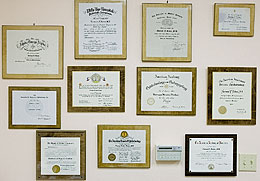
Norman F. Fisher, M.D.
1932—2005
Donations on his behalf may be made to
The Norman Fisher Fund
for the study of Amblyopia at the
Smith Kettlewell Eye Research Institute,
2318 Filmore, San Francisco, CA 94115.
Some of Norman's credentials:
Husband, Father, Mentor, Nurturer, Cheerleader, Comedian, Intellectual, Pediatric Ophthalmologist of 42 years.
Born in Pittsburgh in 1932. Served as Captain in the U.S. Air Force (1952—1956). Graduated Jefferson Medical College, Residency Wills Eye Hospital and Fellowship under Arthur Jampolsky at Smith Kettlewell Eye Research Institute.
Norm approached life with unbounded curiosity and open–mindedness. He had a fantastic intellect and an unparalleled compassion for people, both of which he expressed with profound selflessness and humility. Professionally and privately, he was an ardent caregiver. He changed people’s lives daily.
Norm inspired people to find the best in themselves. He instilled self–respect and taught us by example to live a productive life with the utmost integrity. He encouraged perseverance through tough times, doing one’s best today, and letting tomorrow take care of itself. Norm turned fear into smiles, lifted spirits with his endless good humor and repertoire of anecdotes and jokes, and created a sense of exuberance and readiness to take on the world.
Norm drew respect from all who knew him, regardless of age or origin. He was never too avant–garde for his peers or seniors, nor too sophisticated for children or adolescents. He treated everyone with dignity and made each feel special in some important way. Norman hit a homerun with his life. Many were blessed with his presence throughout his 73 years, and thoughts of him will inspire us forever.
He took great pride in the accomplishments of his wife, Judith, his son, Arthur, Mechanical Engineer and Computer Entrepreneur, his daughter, Ruth, PhD Economist, and his daughter Gwen, PhD Mathematics Education.
The following are clippings that Norm cherished and embodied. He had them taped to his desk, so he could reference them regularly.
I have three personal ideals. One, to do the day’s work well and not to bother about tomorrow. It has been urged that this is not a satisfactory ideal. It is, and there is not one which the student can carry with him into practice with greater effect. To it, more than anything else, I owe whatever success I have had-to this power of sitting down to the day’s work and trying to do it well to that of one's ability, and letting the future take care of itself. The second ideal has been to act the Golden Rule, as far as in my lay, towards my professional brethren and towards the patients committed to my care. And the third has been to cultivate such a measure of equanimity as would enable me to bear success with humility, the affection of my friends without pride, and to be ready when the day of sorrow and grief came to meet it with the courage befitting a man.
Twelve Things to Remember
(1) The value of time
(2) The necessity of perseverance
(3) The satisfaction of working
(4) The dignity of simplicity
(5) The worth of character
(6) The power of kindness
(7) The influence of example
(8) The obligation of duty
(9) The wisdom of economy
(10) The virtue of patience
(11) The gift of our body
(12) The joy of creating
Mohandas K. Gandhi's List of Seven Deadly Sins
(1) Wealth without work
(2) Pleasure without conscience
(3) Knowledge without character
(4) Business without morality
(5) Science without humanity
(6) Worship without sacrifice
(7) Politics without principle
- that life is risk!
- that men’s lives are chains of chances!
- that your fate depends often on the throw of the dice!
- that the unexpected always seems to happen!
- that, come what may, you must be a good soldier!
We all have direct control over our own attitudes if we truly desire it. Mahatma Gandhi said, “They cannot take away your self respect if you do not give it to them.” Eleanor Roosevelt said, “No one can hurt you without your consent.”
-
Look not to others for encouragement, for encouragement comes from within and is the harvest of your own spirit.
Look not to the riches for happiness, for the home of lasting joy is in the richness of the heart, and not in one’s purse.
Look not to fame to bring you love, for fame resides among the restless crowd who know you not.
Look not to fate to help make your way. Better, use God’s greatest gift which is your own uniqueness.
